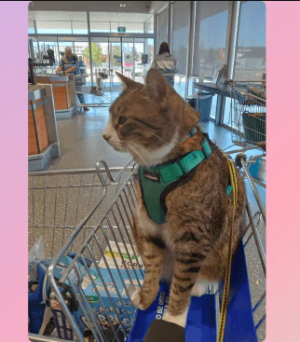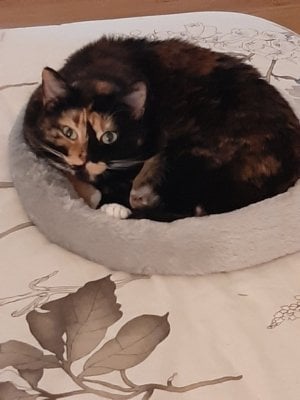Woman's bizarre ALDI find sparks debate among shoppers
An ordinary shopping trip to ALDI took an unexpected turn for one woman when she stumbled upon an unexpected find.
The sight was unusual, to say the least, but the story behind it is even more intriguing.
It also quickly became a topic of heated discussion among shoppers, with varying opinions ranging from disgust to support.
It was a cat, comfortably nestled in a trolley.
But it turns out that the cat was not a stray but an assistance pet—an animal trained to accompany a person with a disability or a mental health condition. While dogs are the most common assistance animals, cats can also serve this role.
These animals are often used to provide emotional support to people with post-traumatic stress disorder (PTSD) or anxiety, helping to reduce stress and even alerting their owners to potential mental health episodes. So, while it may seem unusual, the presence of an assistance cat in a public place like a supermarket is entirely legitimate.
However, when the woman shared her unique discovery on social media, it received mixed reactions from users. Some were curious about the type of assistance the cat provided.
‘How does a cat assist in any way? They only want you when you have the cat food out,’ someone commented.
‘Does it grab things off the shelves for you?’ another asked.
On the other hand, social media users also raised hygiene concerns about putting a cat in the trolley, where food is usually placed.
‘Yuck, assistance or not. I don't believe animals should be allowed in our trolleys where we put our food,’ a person expressed.
Another wrote: ‘How unhygienic to have a cat in a food supermarket.’
Meanwhile, some shoppers pointed out that the presence of an animal in a public place can pose a risk to people with allergies.
‘As someone who is contact allergic to cats and dogs, I really hope you clean the trolley well after putting your animal in there,’ a social media user stated.
‘My kids would be in trouble if they sat there after this cat! They have severe allergies,’ a mum said.
This comment received replies from other shoppers, indicating that people with severe allergies should take extra precautions in a public space.
‘You should be wiping down the trolley if you or your family have severe allergies,’ one of the replies said, while another wrote: ‘Most food is packaged and you should wash it anyway.’
Despite the concerns raised, there are those who highlighted the vital role that assistance animals play in the lives of people with disabilities or mental health conditions.
As one commenter pointed out, 'Honestly, I feel if someone’s mental health feels the need for companionship, show compassion and mind our own business.'
‘I don’t see an issue. If it’s helping a person deal with their life, then that’s all that matters,’ another seconded.
While a third person urged people not to 'make fun of someone who needs this’.

ALDI's store policy about assistance pets is guided by the legislation outlined in the Disability Discrimination Act 1992.
As per this legislation, a person must be able to produce evidence that the animal is an assistance animal and evidence that the animal is trained to meet standards of hygiene and behaviour that are appropriate for an animal in a public space.
Access Link, a disability accessibility agency, is at the forefront of championing inclusion for people with assistance pets.
Here are some tips they've provided on demonstrating greater understanding and support for individuals with disabilities:

What are your thoughts on assistance pets, members? Do you or someone you know have one? Let us know in the comments!
The sight was unusual, to say the least, but the story behind it is even more intriguing.
It also quickly became a topic of heated discussion among shoppers, with varying opinions ranging from disgust to support.
It was a cat, comfortably nestled in a trolley.
But it turns out that the cat was not a stray but an assistance pet—an animal trained to accompany a person with a disability or a mental health condition. While dogs are the most common assistance animals, cats can also serve this role.
These animals are often used to provide emotional support to people with post-traumatic stress disorder (PTSD) or anxiety, helping to reduce stress and even alerting their owners to potential mental health episodes. So, while it may seem unusual, the presence of an assistance cat in a public place like a supermarket is entirely legitimate.
However, when the woman shared her unique discovery on social media, it received mixed reactions from users. Some were curious about the type of assistance the cat provided.
‘How does a cat assist in any way? They only want you when you have the cat food out,’ someone commented.
‘Does it grab things off the shelves for you?’ another asked.
On the other hand, social media users also raised hygiene concerns about putting a cat in the trolley, where food is usually placed.
‘Yuck, assistance or not. I don't believe animals should be allowed in our trolleys where we put our food,’ a person expressed.
Another wrote: ‘How unhygienic to have a cat in a food supermarket.’
Meanwhile, some shoppers pointed out that the presence of an animal in a public place can pose a risk to people with allergies.
‘As someone who is contact allergic to cats and dogs, I really hope you clean the trolley well after putting your animal in there,’ a social media user stated.
‘My kids would be in trouble if they sat there after this cat! They have severe allergies,’ a mum said.
This comment received replies from other shoppers, indicating that people with severe allergies should take extra precautions in a public space.
‘You should be wiping down the trolley if you or your family have severe allergies,’ one of the replies said, while another wrote: ‘Most food is packaged and you should wash it anyway.’
Despite the concerns raised, there are those who highlighted the vital role that assistance animals play in the lives of people with disabilities or mental health conditions.
As one commenter pointed out, 'Honestly, I feel if someone’s mental health feels the need for companionship, show compassion and mind our own business.'
‘I don’t see an issue. If it’s helping a person deal with their life, then that’s all that matters,’ another seconded.
While a third person urged people not to 'make fun of someone who needs this’.

The assistance cate found at an ALDI store sparked debate among shoppers. Image source: Shutterstock
ALDI's store policy about assistance pets is guided by the legislation outlined in the Disability Discrimination Act 1992.
As per this legislation, a person must be able to produce evidence that the animal is an assistance animal and evidence that the animal is trained to meet standards of hygiene and behaviour that are appropriate for an animal in a public space.
Access Link, a disability accessibility agency, is at the forefront of championing inclusion for people with assistance pets.
Here are some tips they've provided on demonstrating greater understanding and support for individuals with disabilities:
- Familiarise yourself with laws and policies regarding service animals.
- Recognise that assistance animals are not limited to aiding the blind and visually impaired; they can support individuals with various physical, psychiatric, and mental health conditions.
- Acknowledge the existence of invisible disabilities, which may not be immediately apparent.
- If you own a business, prioritise inclusivity by educating the staff about relevant laws, ensuring accessible spaces for individuals with assistance animals, making reasonable accommodations to services or facilities when needed, and promptly addressing any complaints related to discrimination.
Key Takeaways
- An ALDI shopper encountered a cat in a shopping trolley at an ALDI store, which sparked an online debate about hygiene and the role of assistance animals in public spaces.
- There was concern over the hygiene and allergy risks associated with having animals in places where food is placed, despite the cat being an assistance pet.
- This incident raised awareness about the variety of roles assistance animals can have, including supporting individuals with PTSD or anxiety.
- More education and awareness are needed around assistance animals, and businesses are encouraged to create an inclusive environment per the Disability Discrimination Act 1992.
What are your thoughts on assistance pets, members? Do you or someone you know have one? Let us know in the comments!









